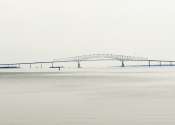Ramping up renewables to power the clean future of inland shipping
Hydrogen and battery-powered barges, tugs, container ships and ferries for inland waterways will help lower emissions from shipping.
Nov 17, 2022
1
10
Energy & Green Tech

Hydrogen and battery-powered barges, tugs, container ships and ferries for inland waterways will help lower emissions from shipping.
Nov 17, 2022
1
10
Engineering

Surveying bodies of water precisely is a challenging task. Authorities and port operators are required to provide up-to-date maps of riverbeds and port facilities. Until now, this has required the use of special mapping vessels ...
Jul 3, 2023
0
3
Energy & Green Tech

It's full steam ahead for the European shipping industry as a new wave of clean-energy tech is set to throw greenhouse-gas emissions overboard.
Sep 7, 2022
1
3
Energy & Green Tech

A shipping container that can test passive cooling systems could help researchers and builders find carbon-free ways to keep people cool in extreme temperatures.
Aug 22, 2023
0
1
Engineering

Biofouling is the growth of algae, mussels, and other marine organisms on the hull of a ship. The fouling increases the flow resistance of the ship—and thus increases fuel consumption and CO2 emissions. Mechanical cleaning ...
Feb 21, 2023
0
7
Engineering

When one of the world's largest container ships crashed into the bank of the Suez Canal in 2021, a major gateway for global trade became blocked with an estimated $9.6 billion in daily commerce being held up.
Dec 1, 2023
0
16
Energy & Green Tech

With their massive sails stretched over towering masts, merchant ships that plied the world's oceans hundreds of years ago helped launch the era of commercial shipping, delivering goods of all kinds to different ports of ...
Jul 29, 2024
0
4
Engineering

The cargo ship collision that destroyed the Francis Scott Key Bridge in Baltimore on March 26, 2024, is raising questions about just how much engineers can do to prevent such catastrophes from occurring in the future. Here, ...
Mar 30, 2024
0
26
Energy & Green Tech

Maritime transport is the backbone of global trade. However, it harms the environment by releasing around 940 million metric tons of CO2 into the atmosphere each year. A factor that contributes to the maritime transport sector's ...
May 17, 2022
0
5
Energy & Green Tech

Transport accounts for 21% of global carbon emissions. It is now the largest emitting sector in many developed countries. While Europe and North America dominate historic transport emissions, much of the projected growth ...
Nov 10, 2021
1
8
A ship /ʃɪp/ Audio (US) (help·info) is a large vessel that floats on water. Ships are generally distinguished from boats based on size and passenger capacity. Ships may be found on lakes, seas, and rivers and they allow for a variety of activities, such as the transport of people or goods, fishing, entertainment, public safety, and warfare.
Ships and boats have developed alongside mankind. In major wars, and in day to day life, they have become an integral part of modern commercial and military systems. Fishing boats are used by millions of fishermen throughout the world. Military forces operate highly sophisticated vessels to transport and support forces ashore. Commercial vessels, nearly 35,000 in number, carried 7.4 billion tons of cargo in 2007.
These vessels were also key in history's great explorations and scientific and technological development. Navigators such as Zheng He spread such inventions as the compass and gunpowder. Ships have been used for such purposes as colonization and the slave trade, and have served scientific, cultural, and humanitarian needs.
As Thor Heyerdahl demonstrated with his tiny boat the Kon-Tiki, it is possible to navigate long distances upon a simple log raft. From Mesolithic canoes to today's powerful nuclear-powered aircraft carriers, ships tell the history of humankind.
This text uses material from Wikipedia, licensed under CC BY-SA